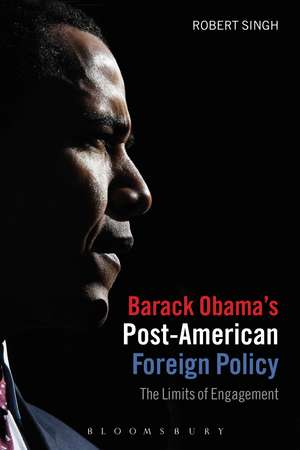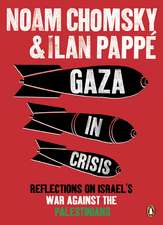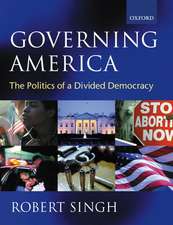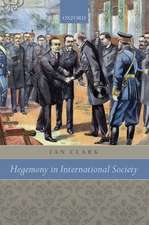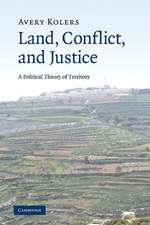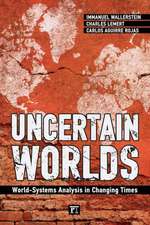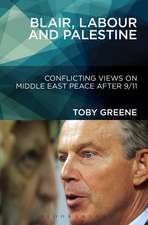Barack Obama's Post-American Foreign Policy: The Limits of Engagement
Autor Robert Singhen Limba Engleză Paperback – 6 iun 2012
| Toate formatele și edițiile | Preț | Express |
|---|---|---|
| Paperback (1) | 199.56 lei 6-8 săpt. | |
| Bloomsbury Publishing – 6 iun 2012 | 199.56 lei 6-8 săpt. | |
| Hardback (1) | 949.98 lei 6-8 săpt. | |
| Bloomsbury Publishing – 6 iun 2012 | 949.98 lei 6-8 săpt. |
Preț: 199.56 lei
Preț vechi: 230.57 lei
-13% Nou
Puncte Express: 299
Preț estimativ în valută:
38.19€ • 39.97$ • 31.78£
38.19€ • 39.97$ • 31.78£
Carte tipărită la comandă
Livrare economică 01-15 aprilie
Preluare comenzi: 021 569.72.76
Specificații
ISBN-13: 9781780930374
ISBN-10: 1780930372
Pagini: 272
Dimensiuni: 156 x 234 x 23 mm
Greutate: 0.43 kg
Editura: Bloomsbury Publishing
Colecția Bloomsbury Academic
Locul publicării:London, United Kingdom
ISBN-10: 1780930372
Pagini: 272
Dimensiuni: 156 x 234 x 23 mm
Greutate: 0.43 kg
Editura: Bloomsbury Publishing
Colecția Bloomsbury Academic
Locul publicării:London, United Kingdom
Caracteristici
Singh's previous book (co-authored with Timothy Lynch): After Bush: The Case for Continuity in American Foreign Policy (CUP 2008), won considerable attention and acclaim, gaining the Richard E. Neustadt Prize in 2009 for best book in American Politics
Notă biografică
Robert Singh is Professor of Politics at Birkbeck College, University of London, UK. His publications include American Government and Politics (2003), Contemporary American Politics: Issues and Controversies (2003), (as co-editor) The Bush Doctrine and the War on Terrorism (2006) and (as co-author) After Bush: The Case For Continuity in American Foreign Policy (2008).
Cuprins
Introduction: Obama, the Post-American World and the Black Man's Burden Inheritance and Transition: Towards an Obama Doctrine? The war on terror Afghanistan and Pakistan Iran Israel & Palestine China Russia Europe Conclusion: The Limits of Engagement Index
Recenzii
An incisive, lucid, and original work. Robert Singh deftly rebuts the conventional wisdom, avoids the platitudes that so often afflict treatments of the subject, and identifies surprising continuities with the Bush era. This is the best book yet written on the Obama foreign policy.
Rob Singh has once more thrown the proverbial cat amongst the liberal, and indeed even some conservative, pigeons in his stimulating new book on Obama's foreign policy. His carefully argued thesis -- that Obama is seeking to do the impossible by trying to manage American decline while preserving US primacy -- is certainly a challenging and original one that will hopefully generate for once a serious open debate about the future of world order in what some are now prematurely calling a post-American world. Another original contribution from one of the great contrarians of the US foreign policy community.
Good books make you think anew your own assumptions and Rob Singh's Barack Obama's Post-American Foreign Policy does that in spades. A scholar of American statecraft but not a partisan to its execution, Professor Singh offers a rich, sometimes biting but always judicious, account of how the realities of the world and American politics have pulled and pushed the Obama administration into following its predecessor's policies far more than its political opponents, the world, or even Mr. Obama himself ever expected.
Rob Singh has two big things exactly right: Barack Obama's hope to transform American foreign policy is truly audacious, but his struggle against past American strategic culture and habits of international leadership is, at best, incomplete. And he offers not just an analysis of the story to date, but a way to understand what a second Obama term would mean.
Outstanding. This is the single best book to grasp and assess the international priorities and overall foreign policy record of the Obama administration. Rather than simply taking for granted the superiority of the president's distinctive foreign policy approach, Singh subjects it to a genuinely sophisticated, nuanced, and critical analysis. He finds that Obama has transformed US foreign policy much less than might have been expected, and that an emphasis on diplomatic engagement has run up against its own limitations. Systematic, intelligent, and thoroughly convincing.
Singh has done the debate over the Obama presidency a great and necessary service. He has managed to depoliticise the assessment of one of the most polarizing presidents of the recent past and offer a preliminary judgement devoid of the rancour and eulogising that accompany contemporary Obama studies. I can think of no book that "gets" Obama in the manner Singh does here. This book is a seminal accounting of what promised to be a transformative international agenda and yet became a misunderstood reworking of the Bush Doctrine. You don't have to like this interpretation; you do have to deal with it.This book is required reading for everyone - American and non-American - that in 2008 invested the Obama presidency with too much hope or too much cynicism. Singh avoids the delusions of both and offers a portrait of a foreign policy that is compelling, critical and historically-informed.
The co-author of the prescient and groundbreaking After Bush now focuses his considerable expertise on President Obama's foreign policy. The result is a highly informative, thought-provoking and important work that challenges much of what passes for conventional wisdom on the subject. A must read for all those interested in contemporary international affairs.
Covering a wide swathe of issues, Singh presents a well-rounded expose of the strengths and weaknesses of Obama's foreign escapades, ensuring this is a must-read for anyone seeking to comprehend the direction of US foreign policy in the post-Bush years.
Dr. Singh's critique of Obama's foreign policy is sober, balanced, scholarly, and engagingly written. At a time when assessments of the Obama administration in the U.S. are colored by partisanship, perhaps it takes a keen foreign observer to provide some genuine insight.
Rob Singh has once more thrown the proverbial cat amongst the liberal, and indeed even some conservative, pigeons in his stimulating new book on Obama's foreign policy. His carefully argued thesis -- that Obama is seeking to do the impossible by trying to manage American decline while preserving US primacy -- is certainly a challenging and original one that will hopefully generate for once a serious open debate about the future of world order in what some are now prematurely calling a post-American world. Another original contribution from one of the great contrarians of the US foreign policy community.
Good books make you think anew your own assumptions and Rob Singh's Barack Obama's Post-American Foreign Policy does that in spades. A scholar of American statecraft but not a partisan to its execution, Professor Singh offers a rich, sometimes biting but always judicious, account of how the realities of the world and American politics have pulled and pushed the Obama administration into following its predecessor's policies far more than its political opponents, the world, or even Mr. Obama himself ever expected.
Rob Singh has two big things exactly right: Barack Obama's hope to transform American foreign policy is truly audacious, but his struggle against past American strategic culture and habits of international leadership is, at best, incomplete. And he offers not just an analysis of the story to date, but a way to understand what a second Obama term would mean.
Outstanding. This is the single best book to grasp and assess the international priorities and overall foreign policy record of the Obama administration. Rather than simply taking for granted the superiority of the president's distinctive foreign policy approach, Singh subjects it to a genuinely sophisticated, nuanced, and critical analysis. He finds that Obama has transformed US foreign policy much less than might have been expected, and that an emphasis on diplomatic engagement has run up against its own limitations. Systematic, intelligent, and thoroughly convincing.
Singh has done the debate over the Obama presidency a great and necessary service. He has managed to depoliticise the assessment of one of the most polarizing presidents of the recent past and offer a preliminary judgement devoid of the rancour and eulogising that accompany contemporary Obama studies. I can think of no book that "gets" Obama in the manner Singh does here. This book is a seminal accounting of what promised to be a transformative international agenda and yet became a misunderstood reworking of the Bush Doctrine. You don't have to like this interpretation; you do have to deal with it.This book is required reading for everyone - American and non-American - that in 2008 invested the Obama presidency with too much hope or too much cynicism. Singh avoids the delusions of both and offers a portrait of a foreign policy that is compelling, critical and historically-informed.
The co-author of the prescient and groundbreaking After Bush now focuses his considerable expertise on President Obama's foreign policy. The result is a highly informative, thought-provoking and important work that challenges much of what passes for conventional wisdom on the subject. A must read for all those interested in contemporary international affairs.
Covering a wide swathe of issues, Singh presents a well-rounded expose of the strengths and weaknesses of Obama's foreign escapades, ensuring this is a must-read for anyone seeking to comprehend the direction of US foreign policy in the post-Bush years.
Dr. Singh's critique of Obama's foreign policy is sober, balanced, scholarly, and engagingly written. At a time when assessments of the Obama administration in the U.S. are colored by partisanship, perhaps it takes a keen foreign observer to provide some genuine insight.
Descriere
This book offers a detailed, balanced and comprehensive examination of the foreign policy of Barack Obama from his evolution as an elected official and presidential candidate, through the 2008 campaigns and the transition, and then across the first term of his presidency.
